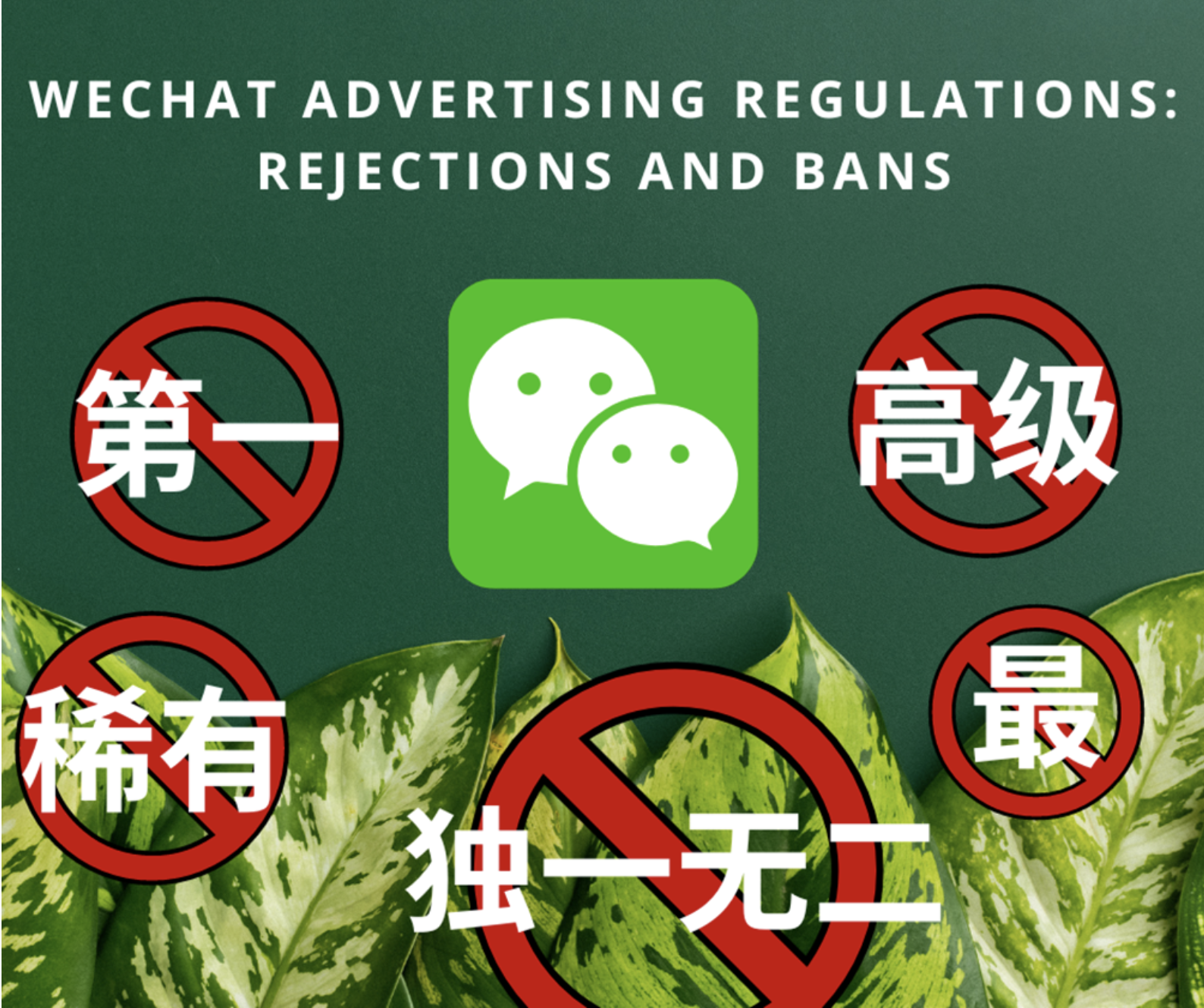Navigating WeChat Advertising Regulations
Navigating WeChat Advertising Regulations
WeChat is a crucial platform in China's digital marketing landscape, boasting over a billion active users. Its extensive reach and diverse functionalities make it an attractive choice for businesses looking to tap into the Chinese market. However, navigating WeChat’s advertising regulations can be complex, with advertisers frequently facing rejections or bans. Understanding and adhering to these regulations is vital to avoid common pitfalls and severe penalties that can be both frustrating and costly.
Understanding the Advertising Landscape
In 2015, China revised its advertising law to strengthen regulations and prevent misleading content. The law applies to all types of content on WeChat, including posts, videos, and advertisements. Its primary aim is to protect consumers by ensuring that advertisements are truthful and not deceptive. While this approach helps maintain transparency and trust between businesses and their audience, it also introduces significant challenges for advertisers accustomed to more lenient regulations elsewhere.
Businesses not registered in China must obtain approval before they can advertise on WeChat. Although the approval process can be seen as a barrier to entry, it ensures that foreign advertisers are aware of and compliant with local norms and regulations. Adhering to these local regulations is crucial for the successful execution of marketing campaigns, helping to prevent issues such as rejections or bans. Compliance not only facilitates smoother operations but also builds credibility and trust with potential customers, demonstrating that you are a responsible advertiser who values transparency and honesty.
Prohibited and Restricted Content
WeChat enforces strict bans on certain types of content to comply with Chinese regulations. Advertisements for tobacco, e-cigarettes, pornography, gambling, superstition, and violence are outright prohibited. Additionally, certain industries, such as alcohol, healthcare, and financial services, face tighter security and must adhere to more rigorous standards. These measures ensure that all advertising content is appropriate and does not mislead or harm consumers.
- Example: Alcohol brands
Alcohol brands face specific regulations that are stricter than in many other countries. Advertisements for alcoholic beverages must not encourage consumption or suggest that drinking alcohol is safe while driving. Furthermore, these ads cannot imply that alcohol can help with relaxation, reduce stress, or improve physical performance. The objective of these restrictions is to ensure that alcohol is not portrayed as a solution for physical or mental health issues. Although navigating these rules can be challenging for brands, especially foreign ones, they reflect China's broader approach to consumer protection and maintaining societal standards.
Key Regulations
WeChat's advertising regulations encompass several essential rules that advertisers must follow to ensure compliance and avoid penalties:
- Avoid Superlatives: Terms like "best" (最佳), "most advanced" (最先进), "one-of-a-kind" (独一无二), "premium" (高级), or any star ratings are prohibited. These words can mislead consumers by suggesting superiority without proof, which is not allowed under Chinese advertising law.
- Avoid False Claims and Exaggerated Promises: Statements such as "rare" (稀有) or "only a few left" (仅剩几件) are not permitted because they can create a false sense of urgency or exclusivity. Advertisements should accurately represent the availability and features of a product without resorting to hyperbole.
- Prohibition of Negative Comparisons and Derogatory Content: Advertisements should focus on the strengths of the product or service being offered without making negative comparisons to competitors or including derogatory remarks. This helps maintain a positive advertising environment and avoids potential legal issues related to defamation.
- Maintain Professional, Non-Suggestive, and Respectful Language: The tone of advertisements should always be professional and respectful. Suggestive content or language that could be considered offensive or inappropriate is strictly prohibited. This includes avoiding any implications of sexual content or vulgarity.
- Truthfulness and Respectfulness: Advertisements must be truthful in all claims and respectful in tone. Misleading consumers or making false claims can lead to ad rejections and potential legal repercussions.
- Non-Discriminatory Language: Ads should not contain any language that could be seen as discriminatory based on race, gender, religion, or social status. Inclusive language is mandatory to ensure fairness and respect for all consumers.
- Avoid Implying Exclusivity or Creating False Urgency: Do not suggest that a product is exclusive or limited in availability without basis. Creating a false sense of urgency can mislead consumers and is not permitted.
- National Symbols and References to Authority: The use of national symbols (such as flags) or references to authority (such as endorsements by officials) is restricted and should only be used when contextually appropriate and legally compliant.
Common Pitfalls Leading to Ad Rejections
Despite understanding the regulations, many advertisers still encounter rejections due to some common pitfalls. Being aware of these frequent mistakes can help in crafting more effective and compliant advertisements:
- Unclear Warning Labels: All warning labels must be clear, legible, and unambiguous. Advertisers often face rejections because warning labels are too small, blurred, or not distinctly separate from the background.
- Misleading CTAs: Avoid misleading call-to-actions (CTAs), such as "click-for-reward" (点击领奖) tactics that can create false expectations. CTAs should clearly state the action required and the result of that action without deception.
- Lack of Necessary Qualifications or Certifications: Claims made in advertisements must be backed by the necessary qualifications or certifications. For example, if a product claims to be "100% organic" (百分之百有机), relevant certification must be provided.
- Outdated Marketing Tactics: Regulations now prohibit certain marketing tactics that were once common. This includes using ambiguous deadlines, making unverified historical claims like "since XXXX year" (自XXXX年), stating broad historical facts like "never before" (前所未有) or "unprecedented in the nation’s history" (史无前例), and incorporating buttons that mislead users about the destination page (e.g., "click here to receive..."). These tactics are considered deceptive and are not allowed.
To avoid these pitfalls, advertisers should ensure that all warning labels are clear and compliant, present products truthfully, avoid exaggerated claims, and submit necessary documentation to support any advertised claims. Additionally, staying updated with WeChat’s evolving policies is crucial for ongoing compliance.
Advertisements must also be clearly identified as such. They should not be disguised as news reports or editorial content. This means that all promotional material should be explicitly marked as "advertisements" (广告) to differentiate them from regular content and prevent consumer confusion. This transparency is crucial in maintaining consumer trust and adhering to advertising standards.
Reporting of Violations and Consequences
WeChat has a structured process for reporting violations of its advertising regulations. Users and consumers can report advertisements they believe to be in violation of the rules. This system aims to maintain the integrity of the platform and ensure that businesses adhere to local laws and cultural sensitivities. However, it also has its drawbacks:
One of the more controversial aspects of this system is the economic incentive for individuals to report violations. Those who report valid breaches of consumer rights can receive monetary rewards. While this encourages vigilance and helps enforce compliance, it can also lead to over-reporting or malicious reporting, where individuals might report advertisements not because they find them genuinely problematic, but because they are motivated by the potential financial gain. Some people even look for advertisement regulation breaches for a living.
Violation of China’s advertising law can lead to various penalties. Non-compliant ads may be rejected or banned, requiring multiple edits and resubmissions. Severe consequences include fines from 10.000 to 1 million RMB, and in extreme cases, the suspension or revocation of business licenses. WeChat, following the 2016 Internet Advertising Law, may take down content or suspend accounts, disrupting marketing campaigns. Legal actions under Chinese law can also result in further fines and sanctions. While the system helps maintain standards, it can be misused, highlighting the importance of careful navigation and compliance.
Conclusion
Navigating WeChat’s advertising regulations is essential for businesses aiming to succeed in the Chinese market. Advertisers must understand the 2015 advertising law revisions, obtain necessary approvals, and comply with strict content bans and regulations. Avoiding common pitfalls such as unclear warning labels, misleading CTAs, and exaggerated claims is crucial for creating compliant advertisements.
Adhering to WeChat’s advertising regulations is vital for executing successful and legal marketing campaigns. Compliance helps prevent penalties and builds trust with the audience by demonstrating transparency and responsibility.
Continuous learning and vigilance are required to stay updated with WeChat’s evolving policies and the dynamic regulatory environment in China. By staying informed and proactive, businesses can navigate these complexities and maintain an effective presence on this vital platform.
Leaf Digital aids international brands in maximizing their online presence in China. With offices in Denmark and Shanghai, they specialize in online sales optimization, social media exposure, and localized branding. Their platform-agnostic approach ensures tailored strategies, aligning with each brand's unique industry, global strategy, and commitment to the Chinese market.



